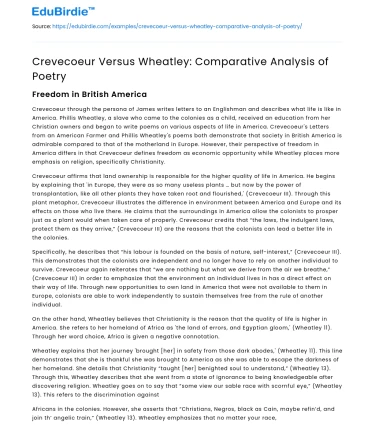Freedom in British America
Crevecoeur through the persona of James writes letters to an Englishman and describes what life is like in America. Phillis Wheatley, a slave who came to the colonies as a child, received an education from her Christian owners and began to write poems on various aspects of life in America. Crevecoeur's Letters from an American Farmer and Phillis Wheatley's poems both demonstrate that society in British America is admirable compared to that of the motherland in Europe. However, their perspective of freedom in America differs in that Crevecoeur defines freedom as economic opportunity while Wheatley places more emphasis on religion, specifically Christianity.
Crevecoeur affirms that land ownership is responsible for the higher quality of life in America. He begins by explaining that 'in Europe, they were as so many useless plants … but now by the power of transplantation, like all other plants they have taken root and flourished,' (Crevecoeur III). Through this plant metaphor, Crevecoeur illustrates the difference in environment between America and Europe and its effects on those who live there. He claims that the surroundings in America allow the colonists to prosper just as a plant would when taken care of properly. Crevecoeur credits that “the laws, the indulgent laws, protect them as they arrive,” (Crevecoeur III) are the reasons that the colonists can lead a better life in the colonies.
Save your time!
We can take care of your essay
- Proper editing and formatting
- Free revision, title page, and bibliography
- Flexible prices and money-back guarantee
Specifically, he describes that “his labour is founded on the basis of nature, self-interest,” (Crevecoeur III). This demonstrates that the colonists are independent and no longer have to rely on another individual to survive. Crevecoeur again reiterates that “we are nothing but what we derive from the air we breathe,” (Crevecoeur III) in order to emphasize that the environment an individual lives in has a direct effect on their way of life. Through new opportunities to own land in America that were not available to them in Europe, colonists are able to work independently to sustain themselves free from the rule of another individual.
On the other hand, Wheatley believes that Christianity is the reason that the quality of life is higher in America. She refers to her homeland of Africa as 'the land of errors, and Egyptian gloom,' (Wheatley 11). Through her word choice, Africa is given a negative connotation.
Wheatley explains that her journey 'brought [her] in safety from those dark abodes,' (Wheatley 11). This line demonstrates that she is thankful she was brought to America as she was able to escape the darkness of her homeland. She details that Christianity “taught [her] benighted soul to understand,” (Wheatley 13). Through this, Wheatley describes that she went from a state of ignorance to being knowledgeable after discovering religion. Wheatley goes on to say that “some view our sable race with scornful eye,” (Wheatley 13). This refers to the discrimination against
Africans in the colonies. However, she asserts that “Christians, Negros, black as Cain, maybe refin’d, and join th’ angelic train,” (Wheatley 13). Wheatley emphasizes that no matter your race, God sees all Christians as equals therefore all who convert to this religion are able to lead a better life. Through conversion to Christianity, all the inhabitants in the colonies have the opportunity to reach salvation and be freed.
Although Crevecoeur and Wheatley have contrasting point of views on what makes society in British America distinct, they both share the belief that freedom is what makes an American colonist different from a Brtish citizen. Whether that freedom be from gaining the ability to own property or from finding enlightenment through religion, American colonists have the opportunity to live a life free from restrictions from the British government. The colonists no longer have to deal with land scarcity or live in ignorance. America gives the colonists the tools to build a life better than what they were given in Europe.
Works Cited
- Crèvecoeur, J. Hector St. John de. “Letters from an American Farmer.” Gutenberg, 3 Sept. 2019, http://www.gutenberg.org/cache/epub/4666/pg4666-images.html.
- Wheatley, Phillis, and Vincent Carretta. Complete Writings. Penguin Books, 2001.






 Stuck on your essay?
Stuck on your essay?

